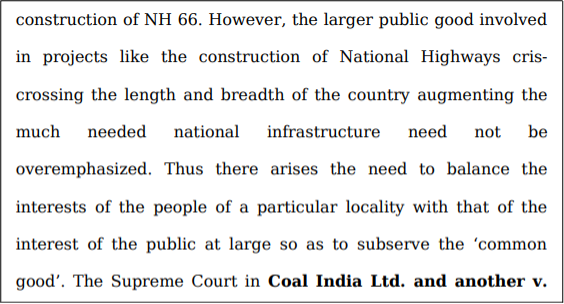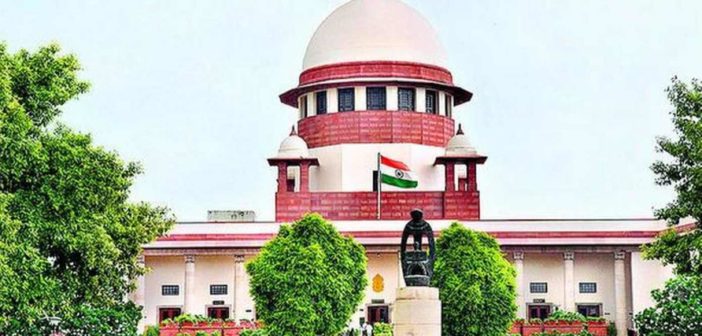In this edition of Court Judgements, we look at the Supreme Court’s orders in a case where it ruled that minor discrepancies in spellings is not sufficient evidence to disprove Indian citizenship, Bombay HC’s ruling that Article 21 of the Constitution, guaranteeing the right to liberty, applies to foreigners as well, and Kerala HC’s observation that interests of the people of a particular locality with that of the interest of the public at large should be balanced.
SC: Minor discrepancies in spellings are not sufficient evidence to disprove Indian citizenship
Md Rahim Ali, a resident of Assam, was declared a foreigner by a Foreigners’ Tribunal (FT) based on discrepancies in documents with respect to spellings and dates. The appellant was alleged to have illegally migrated to Assam from Bangladesh after the cut-off date of 25 March 1971. Despite his name appearing in voter lists since 1965 and his parents’ names appearing in the 1965 list, the FT declared him a foreigner based on a complaint with no supporting evidence. The High Court also upheld the same.
In Md. Rahim Ali alias Abdur Rahim vs. State of Assam & Others, the Supreme Court Bench comprising Justices Ahsanuddin Amanullah and Vikram Nath overturned the FT’s decision and declared Md Rahim Ali an Indian citizen. The Court held that the discrepancies in his documents were not sufficient to disbelieve his claim of Indian citizenship. It pointed out that name spellings on government documents often vary based on language and pronunciation, a common occurrence throughout India. The court also noted that variations in name spelling are common in the preparation of Electoral Rolls and that a casual entry by officials for the preparation of Electoral Rolls cannot lead to the conclusion that the person is not an Indian national. It also observed that it is common for individuals in rural areas to lack government-issued documents, especially when they do not own any property.
In short, the judgment emphasized the importance of considering the socio-economic context and the prevalence of variations in spellings and names in official records.
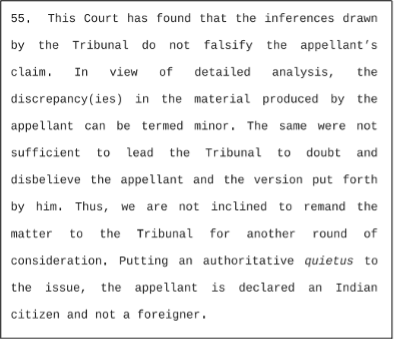
SC: Married men should financially empower their wives
When deciding on a maintenance case, Mohd Abdul Samad vs. The State of Telangana & Another, involving a Muslim woman, the Supreme Court held that Muslim women are entitled to file maintenance petitions under Section 125 of the Code of Criminal Procedure (CrPC), in addition to their rights under the Muslim Women (Protection of Rights on Divorce) Act, 1986.
While passing the judgement, Justice B V Nagarathna emphasized the vulnerability of married women, particularly homemakers, who lack an independent source of income and rely on their husbands for financial support. She asked Indian married men to become conscious of this fact and financially empower their wives by making available financial resources, particularly for personal needs.
The Court recognized the sacrifices made by homemakers, who often save money for household expenses and may not request financial support from their husbands. The Court acknowledged the importance of financial security and security of residence for Indian women and emphasized the need to protect and enhance these aspects. Ultimately, the Court emphasized that a strong Indian family and society rely on the respect and empowerment of women, and that this is essential for building a stronger nation.

Bombay HC: Article 21 of the Constitution, guaranteeing the right to liberty, applies to foreigners as well
Cong Ling, a 38-year-old Chinese national, was stranded in Mumbai since December 2019 after her flight from Beijing was diverted due to bad weather. Customs officials seized gold bars in her possession, leading to her arrest and subsequent legal proceedings. Although acquitted by lower courts, Ling was denied an exit permit by the Immigration Bureau due to a pending appeal by the customs department.
When deciding on the case, Cong Ling vs. FRRO, Justice P K Chavan of the Bombay HC noted the “pathetic plight” of the Chinese woman, who had been living in a chawl in Santacruz since 2019. It also noted the “mental agony, trauma, and sufferings” she endured due to the actions of the authorities as she was alone here and away from her kids even during the pandemic.
The court observed that the customs department’s conduct was “not only wrongful and vindictive but also amounts to gross abuse of its powers in restricting the petitioner from leaving for her country without any justification”. It emphasized the importance of treating foreign nationals equally and protecting their liberty, citing Article 21 of the Constitution as it also reflects on India’s international relations. The court directed the Centre to pay a compensation of Rs. 10 lakhs to Cong Ling for her ordeal and ordered the Immigration Bureau to issue her an exit permit, allowing her to return to China.
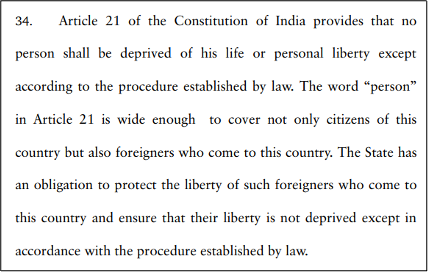
Karnataka HC: Myopic or parochial mindset of teachers should undergo paradigm shift
In Roopesha vs. State of Karnataka, two teachers, Roopesha (drawing teacher) and Sadananda (physical education teacher) at SDM High School in Dharmasthala, were accused of abetting the suicide of a 14-year-old girl student. The girl allegedly consumed rat poison on school premises after being chided by the teachers for talking to a boy. She died the following day. The police initially booked the teachers for offences related to criminal intimidation, sexual harassment, and offences under the POCSO Act and Juvenile Justice Act. After the girl’s death, the charge of abetment to suicide (IPC Section 305) was added.
Justice M Nagaprasanna observed that the teachers’ disciplinary actions were inappropriate and outdated. The judge emphasized the need for a “paradigm shift” in the mindset of teachers and their relationship with student relationships, stating that children should be treated with compassion, especially during adolescence. He criticized the teachers’ “myopic or parochial mindset” and stressed the preciousness of children’s lives. Stressing the importance of adapting to changing times and hoping this case serves as a wake-up call for educators, the Karnataka High Court refused to quash the proceedings against the two teachers. It allowed the case to proceed against them for abetment to suicide and other charges.
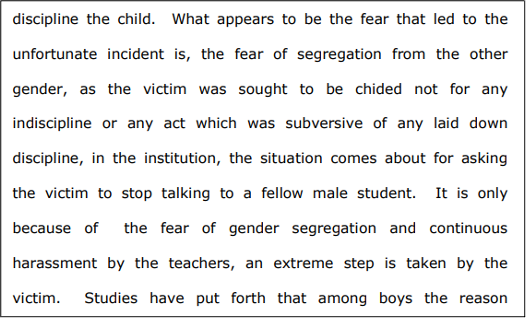
Kerala HC: Interests of the people of a particular locality with that of the interest of the public at large should be balanced
In Abdul Razak vs. Union of India, residents of Malappuram district appealed to the Kerala High Court for the construction of a vehicular underpass on NH66, arguing that that the construction of NH66 without a new underpass would cut off access to essential facilities and institutions located on the other side of the road.
Justice A K Jayasankaran Nambiar and Justice Syam Kumar V M of the Kerala High Court acknowledged the importance of balancing the interests of the people of a particular locality with that of the public at large to serve the “common good”. The court cited the Supreme Court’s interpretation of “common good” as achieving the highest good for the maximum number of people. It noted that while the appellants were raising concerns on behalf of the general public, the larger public good involved in projects like the construction of National Highways should also be considered.
The Court found that the construction of a new vehicular underpass was not necessary, given the existence of a nearby underpass that was already serving the needs of the general public. The court thus dismissed the writ appeal and emphasized the need to consider the broader public interest and the potential safety concerns associated with constructing multiple underpasses in close proximity.
